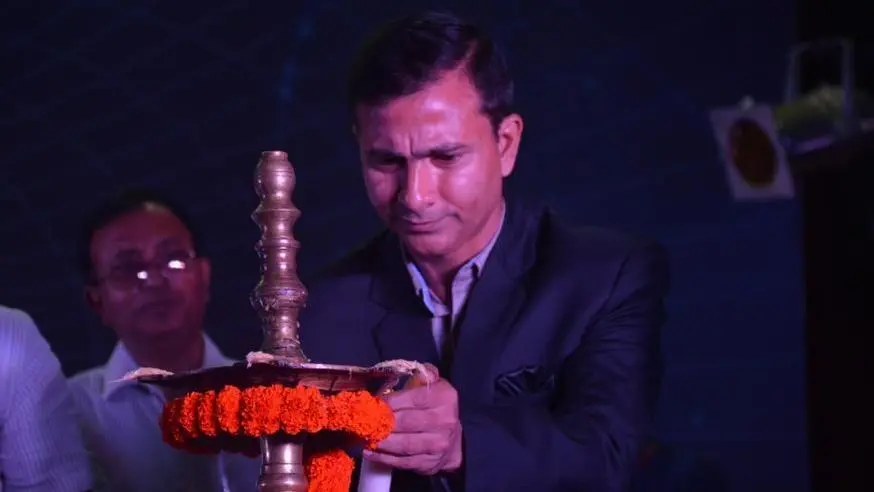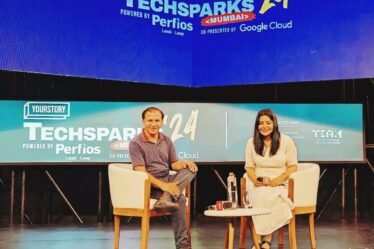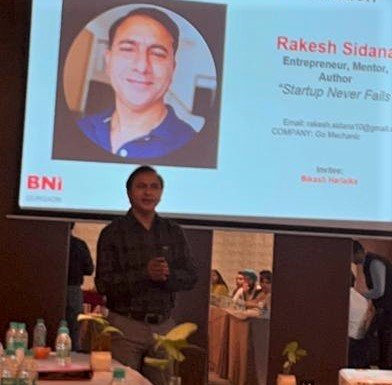
(Interview@ NIT Rourkela)
Nov 6, 2016 | Read: 4 minutes
Author and Inteviewer : Pradhyumna Rao and Dibya
With the onset of the largest techno-management fest of Odisha, Innovision 2016, Team MM caught up with one of the guest speakers, Mr. Rakesh Sidana. Not only is he an entrepreneur with firm instincts , and an out of the box thinker, he is also an innovator and an ingenious personality with undying energy. Here are a few excerpts of our conversation with the founder of MeriCAR.com,
MM: Tell us something about your childhood. Were you always an out of the box thinker? Do you still have an avid interest in painting and singing which were some of your childhood hobbies?
RS: Even in my childhood, I always believed that one should pursue their passion for achieving their goals. My parents and family members always said that I had a different kind of approach towards anything that I put my hands on**. Yes, definitely I had an avid interest in singing and painting landscapes and I owe all of these to my days at Punjab Agricultural University.** During my college days, I used to stay back in the hostel during vacations instead of going home and I used to paint my imagination. I have gifted all my paintings to different departments in my college and some even to my relatives and friends.
MM: You completed your graduation from Punjab Agricultural University, Ludhiana and then did a management course at All India Management Association (AIMA-CME) which are two completely diverse fields. What triggered this sudden change of plans?
RS: Taking up management after studying B. Sc. in Agriculture (Honours) was definitely a different path which I was not expecting since I was in a dilemma about what to do next.
Going for an MBA or appearing for the UPSC exams were two things on my list but then I appeared for MAT (Management Aptitude Test) conducted by AIMA-CME and thus landed up here. In 2010, The Economic Times, Department of Science and Technology and IIMA jointly conducted an entrepreneurship program at IIM, Ahmedabad. This was a 10-day long workshop and was called “The Power of Ideas”. A total of 16,000 entrepreneurs had applied for it, and out of them, only 74 got selected . I was one of those lucky people to bag this opportunity.
MM: You have worked in various dot-com companies like Panalinks and IndiaMART. How has your experience been while working there? After that, you switched to a 1E Ltd. (a London Based IT company) and then you started your consultancy in 2004. What kept you going through all these changes?
RS: Starting a consultancy of your own gives you an upper hand in the sense that you will be able to explore and experiment without having to worry about incurring losses. Even after job hopping for some years, working in various dot-com companies didn’t give me satisfaction which is what led me to start a consultancy of my own. Then I did a project for a large show in Las Vegas. I built a booking system i.e. an online ticket system which was not very common at that time, unlike now. It was a very enriching experience and after that, there was no looking back.
MM: In 2008 you started MeriCAR.com a first-in-India, web portal that helps to find car workshops and service centers. So how did the idea strike your mind?
RS: Back then a huge gap existed in Indian aftermarkets. While working with international clients and exploring the market trends online across the world, I realized the possibility of bridging the gap which gave birth to MeriCAR.com, an online car servicing and repair market for India.
MM: Did your experiences from the dot-com companies help you and meriCAR.com grow?
RS: Having worked in dot-coms earlier, I definitely got to know how dot-com companies are made. Working in Indiamart, under Mr. Dinesh Agarwal, in his earlier team, I gained brilliant exposure and experience. The earlier team refers to the people who actually started the B2B platform. I have also worked with a company helping them to make a client website. Taking an example of Indiamart, in the early days when there was no market and there was not much advertising about Indiamart and B2B, we literally took visiting cards from people, like a small manufacturer and started to make a website of 5 pages from the visiting card which was really a fun and enriching experience.
MM: During this whole process was there anyone who mentored you or was it a self-motivated journey?
RS: I believe in self-motivation. During the early days of my start up I didn’t have a mentor but when I got an investment in 2011, I got a mentor, Mr. Gautam Sinha. He was from a Bombay-based company called ‘My First Cheque’ that invested in my company in 2011. Even though he invested a lot of money, I have always seen him as a mentor because like a mentor he always gave me options, rather than imposing his decisions on me. He believed in me and my company. In 2010, before Gautam Sinha, Mr. Narayana Murthy was my mentor for a brief period. He was chosen by the IIM Ahmedabad to be a mentor for the trainees under the Power of Ideas entrepreneurship workshop.
MM: Car servicing business basically works on an offline model in India. So how confident were you that you would be able to expand your reach to the customers?
RS: When I look back, I had a vision then and I am still in the middle of my journey, now. I did a lot of global research and I was studying what was happening in USA, UK, and other countries when I realized that these ideas can be incorporated into the Indian markets too. India too is changing fast, large investments are flowing in, and new technologies are being developed and applied.When I started MeriCAR.com in 2008, I didn’t know where I would reach but I had an instinct that it would work which propelled me to work further. Today, about more than 50 companies are doing something similar.
MM: Did any venture capitalists fund your start up?
RS:I would say we are still waiting for investment from VC’s. Different VC’s have different ways of looking at companies, some look at large teams, the rest look at other perspectives.
Gautam Sinha has been my biggest investor and that’s how I have survived. It’s not an easy task to keep a company running for 8 years and taking it to another level is even tougher. It was also an achievement to have investment from Rajan Anandan because he only invests in unique companies.
Rajan Anandan was also a mentor. At end of the day, I had two types of investors, Gautam Sinha, who was a typical entrepreneur and understood entrepreneurship and Rajan Anandan, a professional advisor in the context of current global trends.
MM: What obstacles did you face and how did you overcome them?
RS: In the early days**, convincing the right people to join the team was always a challenge. Later on, getting investments was also a hurdle. Moreover, we needed more experts and the market itself was a huge challenge because we had to build it for ourselves. However, the biggest obstacle comes when you do not have a competitor.** When I was in Delhi, telling people that online service is beneficial was not that easy. For 2 -3 years, we didn’t know how to reach them. I was in the newspaper and everywhere possible. I asked people to start using online servicing but they refused, saying that they had no idea about it. I tried pushing them into this because when people join hands in adapting to something new, you can scale your ideas and build the market faster.
MM: What is the current status of MeriCAR.com?
RS: I want my customers to take up MeriCAR.com brand locally which is why MeriCAR is a franchise now. I am reaching out to more people and I have started all over again, right from where I had left. I am still struggling to achieve my goals and I am still exploring into mobile stuff now**. I am exploring car health in association with IIT Delhi and probably this will make MeriCAR.com more sophisticated. The mobile app now has been fitted with a GPS tracker, helping people to find a mechanic nearby. Apart from that, the mobile app can start generating car history. I am now focusing on increasing the technological aspects and simultaneously increasing the business and revenue levels, too.**
MM: You have been mentoring budding entrepreneurs and have given a lot of talks on entrepreneurship at universities like JECRC University Jaipur and IIM Udaipur. It is said that IIM Ahmedabad was where you discovered yourself as an entrepreneur. Can you elaborate on this anecdote?
RS: Meeting with people at IIM Ahmedabad and interacting with them made me discover the entrepreneur within me – one who is creative, innovative, thinks out of the box and is ready to take risks. Earlier I used to think, why I had the instinct to think differently? When I met the entrepreneurs in Ahmedabad, I realized that all the 73 of them did something similar to what I did. That is how I got myself to believe that I have the instinct to develop something new.
MM: The book ‘I Want to Fly. Where are my Wings’ is a motivational book for budding entrepreneurs – how did the idea of writing a book come to your mind? Apart from giving the readers motivation and basic guidelines to go for a startup what other purposes does it serve?
**RS:**Honestly, all these ideas came from my inner self-expressions.
If someone asks me for whom have I written these book, I could say, students, start-ups, and entrepreneurs, but I write books for myself, expressing my inner self.
This book, however, can serve the needs of all. Everybody has a different mindset but this book can be read by anybody and they will be able to relate to it. When I say students have to read it, start-ups have to read it, entrepreneurs have to read it, it is because they are all doing something new and they need motivation. Apart from providing motivation, I have also written a book ” where share is love” which is about the behavior of different facebook users. The new book explores this topic and is flexible to all minds. The chapters have already been written and it will be out soon.
MM: You have also contributed articles to the Times of India and have a blog of your own. Were you always passionate about writing right from childhood or is it something you explored over time?
RS: Initially I wanted to write but could not and thus it slowly developed over time. I was a regular writer for EFY publications. One article which I had written was published as the cover page article -‘HTML is dead’. I wrote this at a time when smart devices were being rolled out where XHTML was being used and CSS was replacing HTML. Even though HTML was there but its use was perishing gradually. I always had an instinct and wanted to express my thoughts.
MM: ‘I want to fly’ is also a non-profit group which you started in February 2015 for unprivileged kids. What is its current status?
RS: I have formed a group and I am raising funds for it. I have written books but all the profit I get from it will go to the group. I want to fund underprivileged kids and develop schools for them. Many NGO’s are there functioning with the same goal but they go individually raising funds for it. There is no common platform. It’s very early to say but I would like to have a common ground raising funds and the funds would go to smaller organizations giving them a broader reach. It’s still under scrutiny and probably will take up shape very soon. I believe that whatever I get from the society, I should be giving it back to them.
MM: What is your success mantra?
RS: Never stop till you have energy. Success does not mean money. Success means the achievement of something you wanted to do. If you want to do something and you are doing it then it is a success.
MM: Your final message for NITR Students?
**RS:**With the audience being technology oriented, I would urge the students to develop technology according to applications. Discover user-friendly technology and sophisticated software which can bridge the existing gap. Do not proceed in a reverse manner: we have to develop technology according to needs, so don’t develop technology and then create needs.
Source: https://mondaymorning.nitrkl.ac.in/article/62d99189ce4cc1042322b376/Exuberant-Ray-of-Innovation-Rakesh-Sidana


